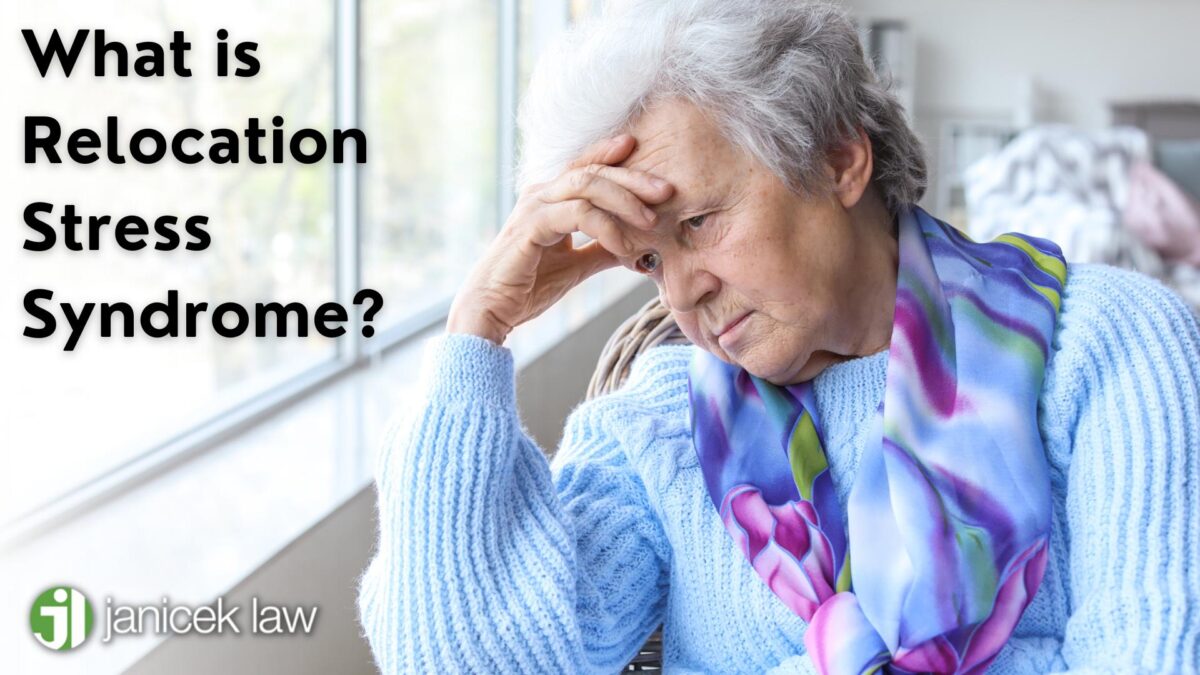When your elderly loved one can no longer care for themselves or live on their own, it can be an incredibly stressful time for the whole family. Families of elderly people often have no other choice but to move their loved one into an assisted living facility for round-the-clock care. This life change is so significant for older adults that it can cause a debilitating mental health condition known as relocation stress syndrome (RSS). Since seniors already experience declines in their overall health, RSS can worsen their health conditions and lead to mental health disorders like anxiety and depression.
The San Antonio elder abuse attorneys from Janicek Law will explain how RSS can occur, the signs to look out for, and how to treat it. If you believe that the nursing facility is contributing to the mental and physical decline of your loved one, you may have grounds to pursue legal action against the facility.
To learn more about your legal options regarding potential abuse and neglect, schedule a free consultation with the compassionate San Antonio assisted living facility injury attorneys at Janicek Law. Contact our law firm today by calling 210-366-4949.
What is Relocation Stress Syndrome?
Relocation stress syndrome (RSS) is a mental health condition that follows a significant move from one environment to another. This condition, also referred to as transfer trauma, often affects older adults following their move into a senior living facility, according to the Journal of Psychological Nursing and Mental Health Services. Relocation stress syndrome can also affect older adults moving from one senior living community to another.
Founder and President of Dementia Care Specialists Kim Warchol, OTR/L, states in an interview with Social Work Today that transfer trauma is a “severe emotional response” to the relocation and can occur before, during, or after the move. She further explains that the “core of transfer trauma is fear, loss of control, loss of choice, and lack of the familiar.”
Transfer trauma is a nursing diagnosis characterized by confusion, anxiety, loneliness, and hopelessness. These mental ailments can also affect the physical and overall health of older adults struggling to remain physically and mentally healthy. An older adult can suffer significant health complications if RSS symptoms aren’t recognized and treated quickly.
Prior to RSS being recognized as an official diagnosis, nurses noticed a decline in their residents’ mental health following their move into assisted living facilities. After years of study, the North American Nursing Diagnosis Association (NANDA) made the diagnosis official, recognizing RSS as a mental health condition.

Transfer Trauma and Relocation Stress Syndrome Symptoms
Like many mental health conditions, relocation stress syndrome can affect everyone differently. If you’re in the process of moving your loved one into a senior living facility, you can watch out for both the mental and physical symptoms of transfer trauma.
- Psychological symptoms of RSS:
- Apprehension
- Anxiety
- Anger
- Confusion
- Depression
- Dependency
- Loneliness
- Insecurity
- Withdrawal
- Physical symptoms of RSS:
- Changes in eating habits
- Headaches
- Falls
- Body aches
- Trouble sleeping
- Fluctuating weight
- Stomach issues
The above symptoms of relocation stress syndrome can often be diagnosed as other ailments. This is why it’s important to continue your relationship with your family member after moving them into an assisted living facility. You know your loved one the best, so you know when they’re experiencing uncharacteristic psychological and physical symptoms. If you suspect your family member is not being treated properly, contact the San Antonio elder abuse attorneys today.

Risk for Relocation Stress Syndrome
Some older adults with certain pre-diagnosed health conditions may be more prone to developing relocation stress syndrome. If your loved one has one of the following health conditions, they may be more likely to suffer from relocation stress syndrome:
- Older adults with few family members, friends, and/or visitors
- Chronic physical health conditions
- Trauma from prior abuse or neglect at another assisted living facility
- History of mental health disorders like depression, anxiety, PTSD, panic attacks, etc.
- Alzheimer’s disease or dementia
- Mobility problems
While RSS can affect any older adult that’s moving to a long-term care facility, women are more susceptible to the condition than men. Regardless, it’s crucial for you and other family members to monitor the health of your loved one following such a significant life event.

How to Prevent Relocation Stress Syndrome Among Elderly People
Moving your loved one into a senior living community significantly changes their everyday life. Not only has your family member lost their independence, but they have lost the home they built and cared for. This is devastating for many elderly people. As you prepare to move your family member to a senior living community, consider the tips below to help the move go smoothly for both of you.
- Validate their feelings: Moving to a new place at any age can be an extremely emotional experience. If your loved one is feeling sad and afraid at their new home, listen to them and validate their feelings. You can help ease their emotions by reassuring them that you’re doing what’s best for them and want them to be as comfortable as possible.
- Involve your loved one in the decision-making process: As older adults deal with declining health, they may become more dependent, making them feel like they are losing control. When family caregivers begin looking for nursing homes, leaving their elderly loved ones out can make them feel even more helpless. During the decision-making process, ask them what nursing homes they might be interested in or if they have any friends living at a facility they want to visit. It’s essential to keep them part of this decision as it affects them the most.
- Recreate their old home: While bringing their old home with them is impossible, you can bring their comforts and meaningful items. Arranging their room like they had at home and adding small touches like pictures and pillows can provide familiar surroundings that can ease relocation stress.
- Hire senior moving experts: One stressful element of moving elderly adults into long-term facilities is the physical move. The National Association of Specialty and Senior Move Managers (NASMM) can help families move their elderly loved ones into nursing homes. Over the years, elderly adults have collected several possessions, which can be challenging to narrow down when packing. These specialists can help your loved one pack and choose what possessions they would most like to bring with them. Having help during this part of the process can take the stress away from both you and your loved one.
How to Help Elderly People Cope With Relocation Stress Syndrome
Helping your loved one cope with moving to their new community is a group effort from the medical staff and family members. If you start noticing the signs of RSS in your loved one, bringing your concerns to their doctors and healthcare providers is critical. Below, we’ve listed some ways that you can help prevent relocation stress.
- Create a daily routine: The staff at the facility can help your loved one create a daily routine that can make them feel more at peace. Routines also give them things to look forward to daily that can break up the monotony.
- Consider therapy: If you and the staff notice the signs of RSS, there’s no shame in asking for help from a psychiatrist or therapist. Your senior can discuss their thoughts and feelings with a therapist who can provide coping strategies. If the therapist believes they could benefit from medication, they can also refer them to a psychiatrist.
- Visit your elderly loved one: While it may not always be plausible, make the time to visit or even FaceTime with your loved one. Seeing familiar faces can help your senior feel less alone and can help ease the transition. You can also set up a recurring visit or call to give them something to look forward to every week.
- Rest: Moving is stressful at any age and can be physically and emotionally exhausting. Ensure that your senior gets plenty of rest following the move so they can feel strong enough to enjoy the activities at their new home.
- Encourage making friends: Meeting new people can be stressful no matter how old you are! Encourage your loved one to branch out and meet new people anyway. Many assisted living facilities schedule events to promote interactions between residents. It’s important that your loved one attends these events so they can make new friends and become more comfortable.

Can Family Members Sue an Assisted Living Facility for Relocation Stress Syndrome?
Relocation stress syndrome is recognized as an official medical diagnosis. Research suggests that RSS can lead to significant declines in their health and well-being. If healthcare providers don’t monitor their residents properly and miss the signs of RSS, families can pursue legal action. In some cases, relocation stress syndrome has led to premature death, increased depression, and a cognitive decline.
If the senior living facility is abusing and/or neglecting your loved one, this can worsen the symptoms of RSS. Contact a San Antonio nursing home death lawyer at Janicek Law as soon as you believe any abuse or neglect is occurring.
Damages for Nursing Home Abuse and Neglect
San Antonio nursing home abuse attorneys at Janicek Law will work diligently to recover damages for your neglect and abuse lawsuit. You could receive financial compensation for the following damages following a successful negligence claim:
- Moving expenses associated with placing your loved one in a better facility
- Medical expenses
- Emotional distress
- Rehab costs
- Physical pain and suffering
- Funeral and burial expenses if the abuse and neglect led to wrongful death
Elder Abuse Lawyer for Relocation Stress Syndrome in San Antonio, TX
The compassionate attorneys at Janicek Law understand how scary it is to move an older adult into a long-term care facility. It’s even more unsettling when the people you trusted to care for your loved one are not doing so and causing them harm.
If you believe your loved one is not adequately cared for at their nursing facility, contact the San Antonio elder abuse attorneys at Janicek Law. We will help you investigate the possible abuse situation, protect your loved one’s legal rights, and obtain a fair settlement on behalf of your family. Call 210-366-4949 to schedule a free consultation with our legal team today.

